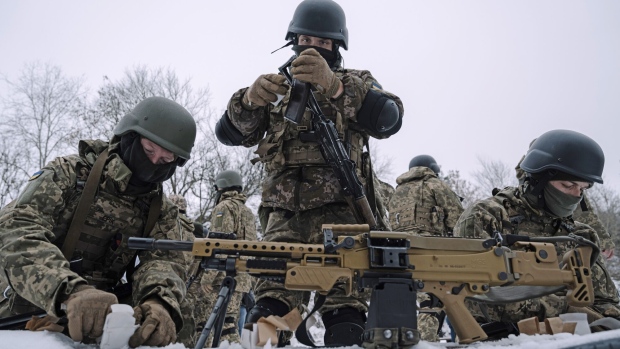Mar 27, 2024
Germany to Speed Up Arms Purchases in Defense Industry Shakeup
, Bloomberg News

(Bloomberg) -- Germany plans to speed up the approval of weapons purchases and provide more planning certainty for big arms contracts in a push to adapt its defense industry after Russia’s invasion of Ukraine.
“If we look at Russia, given this threatening background, we need to ensure we step up production of goods that boost the country’s security capabilities,” Economy Minister Robert Habeck said after meeting with representatives of German arms manufacturers, suppliers, and tech firms in the security sector.
“The global threat situation has changed and not to reflect on it would be naive,” he added in Berlin on Wednesday.
The return of war to European soil after Russia’s attack on Ukraine has forced Germany to rethink its approach to defense and to ramp up spending. Berlin is Kyiv’s second-biggest supporter both financially and militarily after the US and has provided or earmarked as much as €28 billion ($30.3 billion) of aid.
Still, the ruling coalition has been unable to agree on whether to supply much-needed long-range Taurus missiles. While Chancellor Olaf Scholz has spoken out against it for fear of becoming a party to the war, his partners, Habeck and Finance Minister Christian Lindner, favor providing them.
The government created a €100 billion special fund to modernize the German military shortly after Russian President Vladimir Putin launched his invasion and 80% has already been budgeted. Habeck said it’s working on alternative funds once the pot runs out to enable companies to plan larger arms orders.
He added that approval processes for weapons purchases are often too long and must be accelerated. Regulations for dual-use goods, which can be used for both military and civilian purposes, will also be revised, he said after meeting with representatives of companies including Quantum-Systems GmbH, Rheinmetall AG, Rohde & Schwarz GmbH & Co KG and Hensoldt AG.
The minister reiterated calls for a European Union commissioner for defense who could help to coordinate a common procurement market in the bloc.
©2024 Bloomberg L.P.







